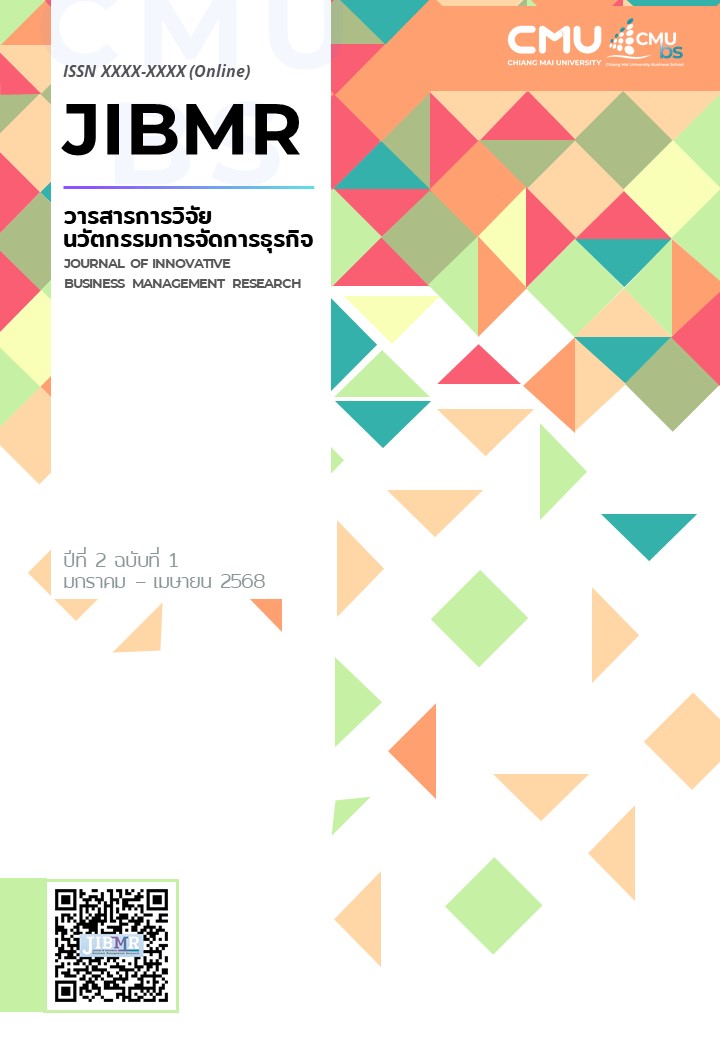Behavior of Consumers in Chiang Mai Province Towards Management of Post-used Beverage Packaging Disposal
Keywords:
attitude towards behavior, subjective norm, perceived behavioral control, waste management, beverage packagingAbstract
The issue of beverage packaging waste is a significant environmental concern, particularly in Chiang Mai, where high tourism activity contributes to increasing waste levels. This study aims to examine consumer behavior in managing post-consumed beverage packaging using the Theory of Planned Behavior (TPB) as the primary analytical framework. The study focuses on three key factors: Attitude Toward Behavior, Subjective Norms, and Perceived Behavioral Control influencing consumer intentions and actions. This research employs a qualitative approach through in-depth interviews with 30 consumers residing in Chiang Mai. Data was analyzed using Thematic Analysis, revealing that consumers with a positive attitude and social support are more likely to engage in proper waste management practices. Additionally, convenience and perceived behavioral control significantly influence actual behavior. Key challenges identified include the complexity of waste separation, lack of knowledge on recycling, and low confidence in waste management systems, leading some consumers to opt out of waste separation practices. The findings highlight opportunities to promote sustainable packaging waste management through education on the 3Rs (Reduce, Reuse, Recycle), improvements in waste management infrastructure, and encouraging businesses to adopt eco-friendly packaging. The insights from this study can inform public policy development and marketing strategies to enhance consumer participation in reducing beverage packaging waste.
References
Ajzen, I. (1991). The theory of planned behavior. Organizational behavior and human decision processes, 50(2), 179–211. https://doi.org/10.1016/0749- 5978(91)90020-T
Ajzen, I. (2006). Perceived behavioral control, self‐efficacy, locus of control, and the theory of planned behavior. Journal of Applied Social Psychology, 32(4), 665–683. https://doi.org/10.1111/j.1559-1816.2002.tb00236.x
Borusiak, B., Szymkowiak, A., Pierański, B., & Szalonka, K. (2021). The impact of environmental concern on intention to reduce consumption of single use bottled water. (Master’s thesis) Poznan University of Economics and Business.
Braun, V., & Clarke, V. (2006). Using thematic analysis in psychology. Qualitative research in psychology, 3(2), 77–101.
https://doi.org/10.1191/1478088706qp063oa
Canpack. (2020). Why choose glass beverage packaging? Retrieved 27 May 2024 from https://www.canpack.com/insights/why-choose-glass-beverage-packaging/
Department of Mineral Fuels, Ministry of Energy. (2020). Solving Chiang Mai’s waste problem must start with serious sorting. Retrieved 12 June 2024, from https://dmf.go.th/public/list/data/detail/id/14300/menu/593
Just Bottle. (2024). The benefits and drawbacks of different water bottle materials. Retrieved 21 May 2024, from https://www.justbottle.co/en-th/pges/understandin the-benefits-and-drawbacks-of-different-water-botterials
Khan, F., Ahmed, W., & Najmi, A. (2019). Understanding consumers’ behavior intentions towards dealing with the plastic waste: perspective of a developing country. Resources, Conservation and Recycling, 142, 49–58. https://doi.org/10.1016/j.resconrec.2018.11.020
Phattaratikhom, T. (2022). Factors influencing recycling behavior among urban Thai consumers: A TPB perspective [Independent study, Chulalongkorn University]. https://doi.org/10.58837/CHULA.IS.2022.201
PBS, T. (2018, May 7). Kid Rangers: Smart Kids Mission – Plastic bottles [Video]. Thai PBS. Retrieved 5 June 2024, from
https://www.thaipbs.or.th/program/KidRangers/episodes/52380
PBS, T. (2023, August 3). Chiang Mai accelerates waste management of over 300 tons per day. Thai PBS. Retrieved 5 June 2024, from https://www.thaipbs.or.th/news/content/330255
Phumiyut, T., & Office of Natural Resources and Environmental Policy and Planning. (2022). Plastic waste. Retrieved 10 May 2024, from
ttps://www.onep.go.th/ขยะพลาสติก%2F
R.C.I. (2023, May). Beverage packaging: Innovations, challenges, and the road ahead. Retrieved 23 May 2024, from https://l.rccolainternational.com/blog /beverage- packaging-innovations-challenges-and-the-road-ahead
SCG. (2021). 5 eco-friendly materials for beverage packaging. https://www.scg.com/climate-emergency/5-packaging-save-the-world/
Sub_Tik. (2024, February 22). Singha reinforces market leadership by launching label-free eco-friendly bottle. Prachachat Business. Retrieved 14 May 2024, from https://www.prachachat.net/marketing/news-1506486
Tando Beverage. (2022). Beverage packaging: An amazing tool for your marketing strategy. Retrieved 26 May 2024, from https://tandobeverage.com/beverage- packaging/
Tetra Pak. (2023). Benefits of aseptic paper-based cartons. Retrieved 8 June 2024, from https://www.tetrapak.com/en-th/campaigns/go-nature-go-carton/explore/food
Thai Beverage Can. (2024). Why switch to aluminum cans for beverages. Retrieved 18 May 2024, from https://thaibeveragecan.com/th/why-we-should-switch-to-aluminum-cans-for-beverages/
UN-Habitat. (2024). World Cities Report 2024: Case Study Annex. Retrieved 27 May 2024, from https://unhabitat.org/sites/default/files/2024/11/world_ cities_report_2024_case_study_annex.pdf
Wildpack Beverage. (2022, March 12). Beverage packaging types. Retrieved 5 June 2024, from https://wildpackbev.com/beverage-packaging-types/
Downloads
Published
How to Cite
Issue
Section
License
Copyright (c) 2025 Journal of Innovative Business Management Research

This work is licensed under a Creative Commons Attribution-NonCommercial-NoDerivatives 4.0 International License.
The opinions and content expressed in the articles are solely those of the individual authors and do not necessarily reflect the views of the journal or the authors’ affiliated institutions. Authors are fully responsible for the accuracy and correctness of their work.
Any reuse, reproduction, or redistribution of the articles, content, data, or images in other forms requires prior written permission from the Journal of Innovative Business Management Research.



